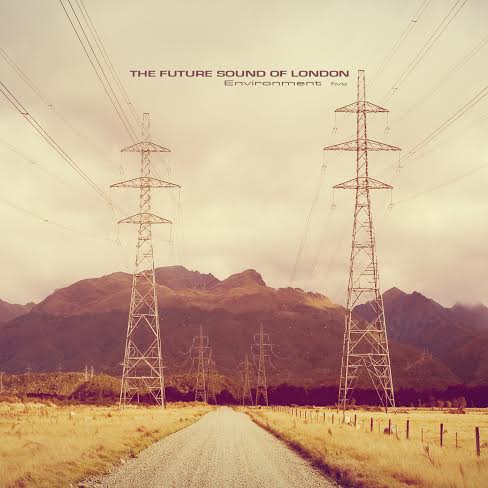The visionary author J.G. Ballard famously feared the worst thing that could beset the future is that it becomes boring – what he described as a "vast, conforming suburb of the soul." Sometimes, I fear his fears were correct. The new normal is, well, normal. Recent comeback albums by stalwart 1990s electronic artists like Boards Of Canada, Aphex Twin, and Daft Punk, while very good indeed, do little more than hit the bases, almost as if they were composed by some aesthetic aggregation tool: Tomorrow’s Harvest features much wow-and-flutter; Syro skitters along inoffensively; Random Access Memories accesses random memories, alright. I like them all very much; still, those records are many things, but weird isn’t one of them.
Now it’s the turn of Future Sound Of London’s Garry Cobain and Brian Dougans to accept their elder statesman status, and re-claim turf in an increasingly crowded landscape of self-consciously future-minded musicians. Thing is, Environment Five, the duo’s first entirely new output under the FSOL moniker since 1996’s Dead Cities, is a tad of an anachronism: it safely sounds a lot like past Future Sound Of London. But is that safety boring? No. Environment Five‘s success rests in its ability to temper novelty with venerability.
Since the holy trinity of albums that was Lifeforms, ISDN, and Dead Cities, Future Sound Of London fell from the radar for a time, springing up here and there under a handful of their other aliases (my favourites include ‘Yage’ and ‘Orgone Accumulator’), and releasing four albums-worth of archival material through the Environments series. But this, the fifth element, is their first set of fresh recordings in nearly 20 years, laid down in the first half of 2014 with collaborators Daniel Pemberton, Raven Bush, and Riz Maslen (whose super-smart Neotropic project was among the most underrated acts of the late 1990s). As the band describes austerely, Environment Five "explores the space/time/dimension that exists when we die. The moment of departure." But there’s more life to them than that.
‘Point Of Departure’, the album’s opener, begins on luscious minor synth swells and a somber alto saxophone loop, before a seductive laid-back beat, backed by an extremely funky bass riff, takes over. Next, ‘Source Of Uncertainty’, a brief palate-cleanser, offers an arrestingly melancholy piano melody, until ‘Image Of The Past’ kicks into another rolling jazzy groove, punctuated by a chirpy flute and serrated lead. ‘Beings Of Light’ contains a chorus that could have been an out-take from ‘Everyone In The World Is Doing Something Without Me’. And with its augmented violin and tabla, ‘In Solitude We Are Least Alone’ is the piece that harkens most back to The Isness/Alice In Ultraland turn, the band’s slightly sophomoric psychedelic cycle released in the mid-noughties under their Amorphous Androgynous guise.
But the goofy fish-eyed lens vibe of those albums is gone, and a more sober sincerity now takes its place. Over Environment Five‘s duration, FSOL treat listeners to arguably some of their best work – sure to please completists and newcomers alike. It is a pretty, spacious recording. And as much as the album is satisfying, it is the 3-track companion EP – a free download with purchase – which actually stands best next to FSOL’s finest material. The EP’s stomping inaugural number, ‘Electric Brain Storm’, was produced using Electronic Music Studios’ 1970s-era Synthis – the legendary British make of synths Pink Floyd used to produce ‘On The Run’. And ‘HereAfter’, with its Shackleton’y galloping rhythm and anthemic Prog Rock organ line, firmly plants the FSOL flag back upon the mountaintop.
The gulf in production value between Environment Five and any given laptop/ software artist is overwhelming: it’s obvious that FSOL have a lot of really top gear to play with, and have further honed their craft through the years, which makes the album just sound so much better than almost everything else out there. It’s less an album than a mantra, a chant, an incantation. And it makes you realize that you’ve forgotten how good electronic music could, and should, sound.
The thing I respect most about FSOL is that they had the confidence in their work, and the respect for their fans, to release a long, long-awaited recording without a ridiculous marketing campaign – there was no blimp, no stencils, scavenger hunts, billboards, web series, nor invite-only Nevada desert listening parties. I wouldn’t have even known about Environment Five had I not come across it by pure chance. And partly because of their modesty, nobody seems to be giving FSOL credit where credit is due.
But this band was among very few of central importance (along with the Orb, of course) to radically reshaping the sound and structure of ambient, trip-hop, and techno. It would be a real dishonour to expect them to do it all again. That would be like admonishing Jonas Salk for not figuring out a cure for HIV/AIDS, rather than celebrating him for introducing the first Polio vaccine. In the mid-1990s, not many artists were making music like FSOL, and just because more of them are today does not diminish their current achievements. If anything, it should reinforce them: their musical DNA is now firmly embedded into a whole new ecosystem of lifeforms. There’s certainly inflections of FSOL throughout the oeuvres of artists like Dalhous, Oneohtrix Point Never and Lee Gamble.
Electronic musicians also tend to be more immune from the late-style plague of Pop, Hip-Hop, and other genres associated with youth. Electronic music is entering into its golden years (after all, the Moog is 50). It’s finally getting comfortable in its own skin. So, what of the future, then? If it is indeed boring, can’t something be both boring and great? Any lasting relationship, for example, is comprised of lots of indistinguishable days. Even exciting can get boring. Boredom is a sign of durability. And I’d rather have a durable future than no future at all.
Do Future Sound Of London have a future? I hope so.
<div class="fb-comments" data-href="http://thequietus.com/articles/16325-future-sound-of-london-environment-five-review” data-width="550">


